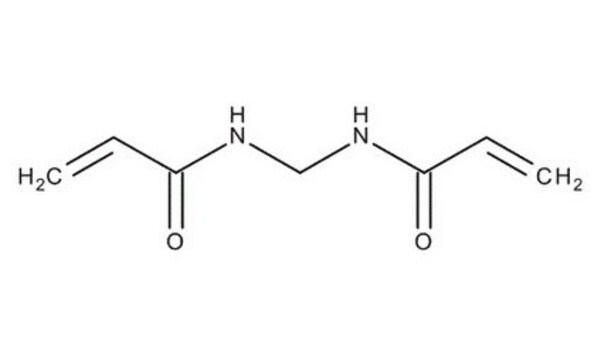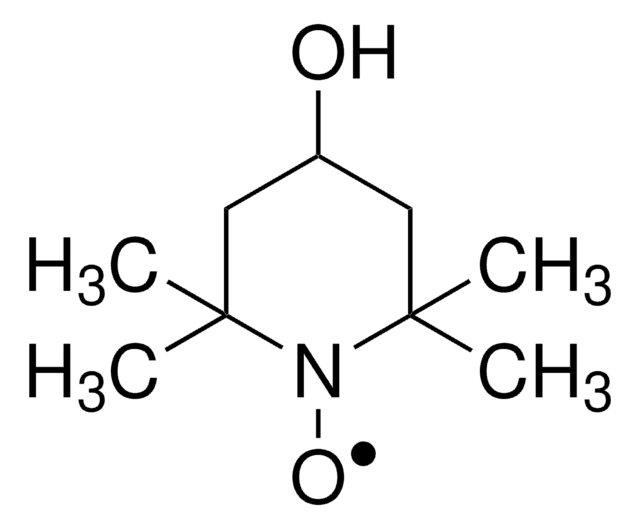M7279
N,N′-Methylenebisacrylamide
powder, for molecular biology, suitable for electrophoresis, ≥99.5%
Synonym(s):
BIS
About This Item
Recommended Products
grade
for molecular biology
Assay
≥99.5%
form
powder
technique(s)
electrophoresis: suitable
impurities
≤0.05% Free carboxylic acid (T)
≤50 mg/kg Total sulfur (as SO4 ) (ICP)
conductivity
≤10 μmho (2% solution)
anion traces
chloride (Cl-): ≤50 mg/kg
cation traces
Ca: ≤10 ppm
Cd: ≤5 ppm
Co: ≤5 ppm
Cr: ≤5 ppm
Cu: ≤5 ppm
Fe: ≤5 ppm
K: ≤50 ppm
Mg: ≤5 ppm
Mn: ≤5 ppm
Na: ≤50 ppm
Ni: ≤5 ppm
Pb: ≤5 ppm
Zn: ≤5 ppm
absorption
≤0.2 at 290 at 1%
foreign activity
DNase and RNase, none detected
SMILES string
C=CC(=O)NCNC(=O)C=C
InChI
1S/C7H10N2O2/c1-3-6(10)8-5-9-7(11)4-2/h3-4H,1-2,5H2,(H,8,10)(H,9,11)
InChI key
ZIUHHBKFKCYYJD-UHFFFAOYSA-N
Looking for similar products? Visit Product Comparison Guide
General description
Application
- as a crosslinker in the monomer solution to prepare N,N-dimethyl acrylamide (DMAAm)-based cryogel and acrylamide (AAm)-based cryogel matrix
- as a crosslinker to prepare tough hydrogel network
- in the preparation of acrylamide-bisacrylamide stock solution for the preparation of polyacrylamide gel
Signal Word
Danger
Hazard Statements
Precautionary Statements
Hazard Classifications
Acute Tox. 3 Oral - Acute Tox. 4 Dermal - Carc. 1B - Muta. 1B - Repr. 2 - STOT RE 1 Oral
Target Organs
Peripheral nervous system
Storage Class Code
6.1C - Combustible acute toxic Cat.3 / toxic compounds or compounds which causing chronic effects
WGK
WGK 3
Flash Point(F)
Not applicable
Flash Point(C)
Not applicable
Personal Protective Equipment
Certificates of Analysis (COA)
Search for Certificates of Analysis (COA) by entering the products Lot/Batch Number. Lot and Batch Numbers can be found on a product’s label following the words ‘Lot’ or ‘Batch’.
Already Own This Product?
Find documentation for the products that you have recently purchased in the Document Library.
Customers Also Viewed
Articles
NMR Analysis of Glycans
Our team of scientists has experience in all areas of research including Life Science, Material Science, Chemical Synthesis, Chromatography, Analytical and many others.
Contact Technical Service








